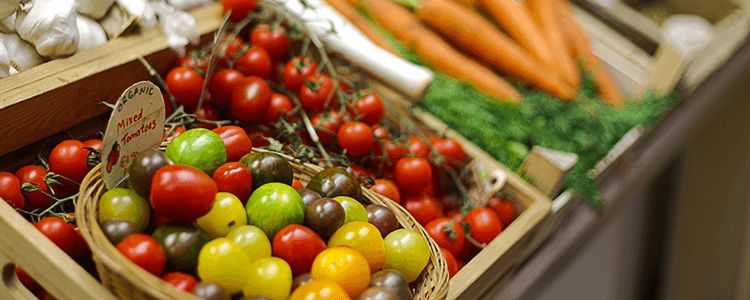There are many factors which influence how your fresh fruit and vegetables should be stored. As such, it can be challenging to know the correct storage solution that should be used.
This guide looks at the aspects when using cold storage for fruit and vegetables and why you should utilise cold storage to stock and distribute your fresh produce.
What are the benefits of using commercial refrigeration when storing produce?
Without cold storage, most fruits and vegetables will not stay fresh for more than a few days. As soon as fresh produce is harvested, it begins to deteriorate, and dangerous bacteria begin to develop.

The low temperatures inside cold storage units halt the growth of these pathogenic fungi, ensuring that spoilage of fruits and vegetables is kept to a minimum.
Refrigeration and blast freezing are equally popular options for many vegetables and some selected fruits. CRS cold storage units have a varied temperature range for both freezing and chilling options.
This table shows the guideline for storing common types of produce.
|
Produce Type |
Optimum Temperature °C |
Optimum humidity % |
Storage life |
|
Apples |
1-4 |
90-95 |
Up to 12 months |
|
Bananas |
13-16 |
80-95 |
Up to 3 weeks |
|
Berries (incl. Strawberries) |
0 |
90-95 |
Blackberries and raspberries up to 3 days, strawberries and cherries up to 7 days |
|
Grapes |
0 |
85 |
Up to 8 weeks |
|
Nectarines, plums and peaches |
0 |
90-95 |
Up to 5 weeks |
|
Pears |
-1-0 |
90–95 |
Up to 7 months |
|
Broccoli and cauliflower |
0 |
95-100 |
Up to 4 weeks |
|
Carrots, mature and immature |
0 |
98-100 |
Mature, up to 9 months and immature up to 6 weeks |
|
Onion, white and red |
0 |
65–70 |
Up to 8 months |
|
Lettuce |
0 |
98–100 |
Up to 3 weeks |
All CRS cold store refrigeration units provide a temperature range between -40°C to +10°C to help secure the freshness and nutrients of your fruits and vegetables.
What type of cold storage is suitable for fruits and vegetables?
Most cold storage units are incredibly versatile! So there are plenty of options for storing and distributing your produce.
Refrigerated Containers
CRS refrigerated containers come in various sizes from 10ft to 45ft and have a temperature range of -40°C to +10°C. Most cold store units are portable and can be used to transport goods safely. Mega Cold Stores are also a popular option for larger businesses. These units are combined with multiple cold storage units for a mega refrigerated solution.
Blast Freezers and Chillers
For businesses looking to stock and distribute frozen produce, CRS offers rapid Blast Freezers. With temperatures as low as -40 °C, you can freeze various fruits and vegetables.
Whether you're looking to extend your commercial refrigeration or are considering branching out into the fruit and veg market, a portable cold storage solution will extend the life of your fruits and vegetables in storage and transit.
Cold Rooms
CRS Grade A specification Cold Rooms are ideal for both hygienic food processing areas and fresh produce storage. These units are an excellent solution for businesses looking for custom cold storage for their fruits and vegetables.
What are the best practices for fruit and vegetable storage?
As you know, it can be challenging to correctly store fruits and vegetables, which is why adhering to cold storage best practices is essential for the longevity and quality of your fruit and veg.
Fruit and veg should always be stored separately!
Most fruits produce a hormone called ethylene, which, unfortunately, affects all surrounding produce. This hormone changes the texture, colour, and flavour of the produce and speeds up the ripening process considerably. If fruits are stored alongside vegetables, the risks will result in food wastage.
Adhere to good storage practices
Avoid overstocking your cold storage unit above its capacity, which raises the internal temperature and speeds up produce deterioration. Tightly packed pallets should also be avoided as the crushing of the products can occur, leading to the development of bacterial growth.
Pack your fruit and veg so that there is enough room for the internal fan to distribute cool air freely.
Understand the history of your produce
Distributors should know the history of fruits and vegetables to make the best decision regarding cold storage and transportation arrangements. This includes product maturity, prior goods preparation, quality inspections, and produce grading.
Whilst cold storage can increase the longevity of your fruits and vegetables, your products still need some TLC to keep them at their best. Look after your fruit and veg, and you'll extend their lifespan considerably.
Secure the freshness of your fruit and veg with correct cold storage! CRS offer tailored solutions to your requirements that will help to accelerate your business growth. Fill in the form, and one of our specialists will be in touch to discuss the perfect solution for you.













